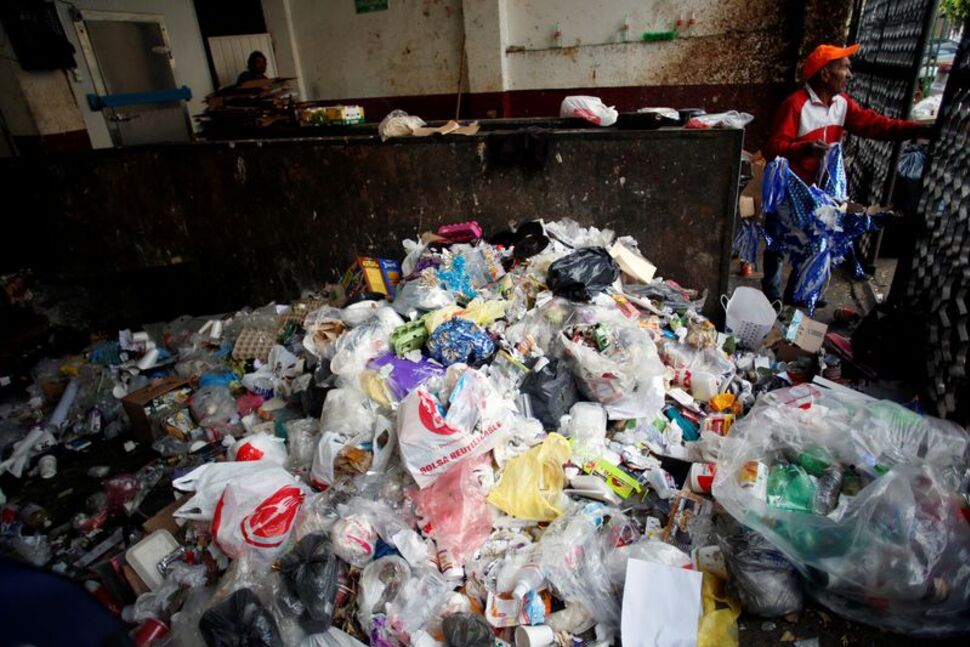United Nations member states are set to meet this month in Nairobi to draft the blueprint for a global plastics treaty, a deal that could see countries agree for the first time to reduce the amount of single-use plastics they produce and use.

It’s being touted as the most important environmental pact since the 2015 Paris Agreement on climate change.
A global explosion of disposable plastic, which is made from oil and gas, is increasing carbon emissions, despoiling the world’s oceans, harming wildlife and contaminating the food chain. More than 50 countries, including all 27 members of the European Union, are calling for the pact to include measures targeting plastic production.
That’s a problem for big oil and chemical companies. The industry is projected to double plastic output worldwide within two decades.
Publicly, plastic industry groups representing firms like ExxonMobil Corp, Royal Dutch Shell Plc and Dow Inc, have expressed support for a global agreement to tackle this garbage.
Behind the scenes, however, these trade organizations are devising strategies to persuade conference participants to reject any deal that would limit plastic manufacturing, according to emails and company presentations seen by Reuters, as well as interviews with a dozen officials involved in the negotiations.
Leading that effort is the American Chemistry Council (ACC), a powerful group of U.S.-based oil and chemical firms. The Washington-based ACC is attempting to forge a coalition of big businesses to help steer treaty discussions away from production restrictions, according to an Oct. 21 email sent from the trade group to a blind-copied list of recipients. Reuters received a copy of that email from an employee of a consumer goods company who requested anonymity.
The ACC has dubbed the proposed alliance “Business for Plastic Pollution Action,” according to the email, which called on firms to “shift the debate” by focusing governments’ attention on the benefits of plastic. The group planned to hold monthly meetings and share policy recommendations with governments, according to the email.
The ACC did not respond to Reuters’ questions about the email or the proposed business coalition.
Plastic is embedded in modern life and indispensable to sectors such as automaking. The plastics industry has been quick to cite such applications in defending unfettered production.
But it is throwaway plastics such as food wrappers, grocery bags and delivery packaging that are the main focus of the U.N. conference. Single-use plastic accounts for around 40% of all production, according to a landmark 2017 study in the journal Science Advances.
The ACC has long defended disposable plastics as better for the planet than alternatives such as glass and cardboard, which are heavier and require more fossil fuel to transport. Some climate scientists say that analysis is flawed because it doesn’t take into account the massive societal cost to managing plastic garbage, which is hard to recycle, slow to degrade and expensive to collect, bury and burn.
LOBBYING
Meanwhile, the ACC and its Brussels-based counterpart, Plastics Europe, have been meeting privately with government officials ahead of the talks to press their case, according to correspondence obtained by Reuters through freedom of information requests and interviews with four people involved in the talks.
The ACC last year held a telephone briefing offering U.S. officials its own vision for what the Nairobi treaty should look like, according to a March 3 email invitation sent to the U.S. Environmental Protection Agency (EPA) and obtained by Reuters.
Documents attached to that invitation outlined the ACC’s opposition to potential production caps on plastic. Among its claims: that global inequality would worsen due to increased food waste and less access to clean water in the developing world if restrictions were enacted. Big consumer brands have used single-use plastic packaging to sell basic goods in poor countries, a move that has increased their revenues but fueled widespread waste pollution.
The ACC briefed EPA twice last year as to its views on plastic, once in March and again in July, the agency told Reuters.
It’s not unusual for industries to interact with government agencies. Still, the ACC has been in regular contact with EPA and the U.S. State Department, voicing opposition to domestic and international efforts to restrict the use of plastic, according to correspondence accessed by Reuters through freedom of information requests.
Against the backdrop of the coronavirus pandemic, meanwhile, Plastics Europe is citing public health as a reason for U.N. delegates to steer clear of production caps or bans on throwaway plastics. In a presentation sent Dec. 16 to European Union officials and seen by Reuters, the trade group said any such restrictions could have “unintended consequences” given high demand for disposable masks, gloves and water bottles.
Plastics Europe did not respond to questions about its presentation or lobbying efforts. The group “has significant concerns about the introduction of new mandatory restrictions,” its managing director, Virginia Janssens, said in an email.
[contextly_sidebar id=”3JnDSzM8d0OqO8xxkV1aDhYnEYRFCbfr”]



